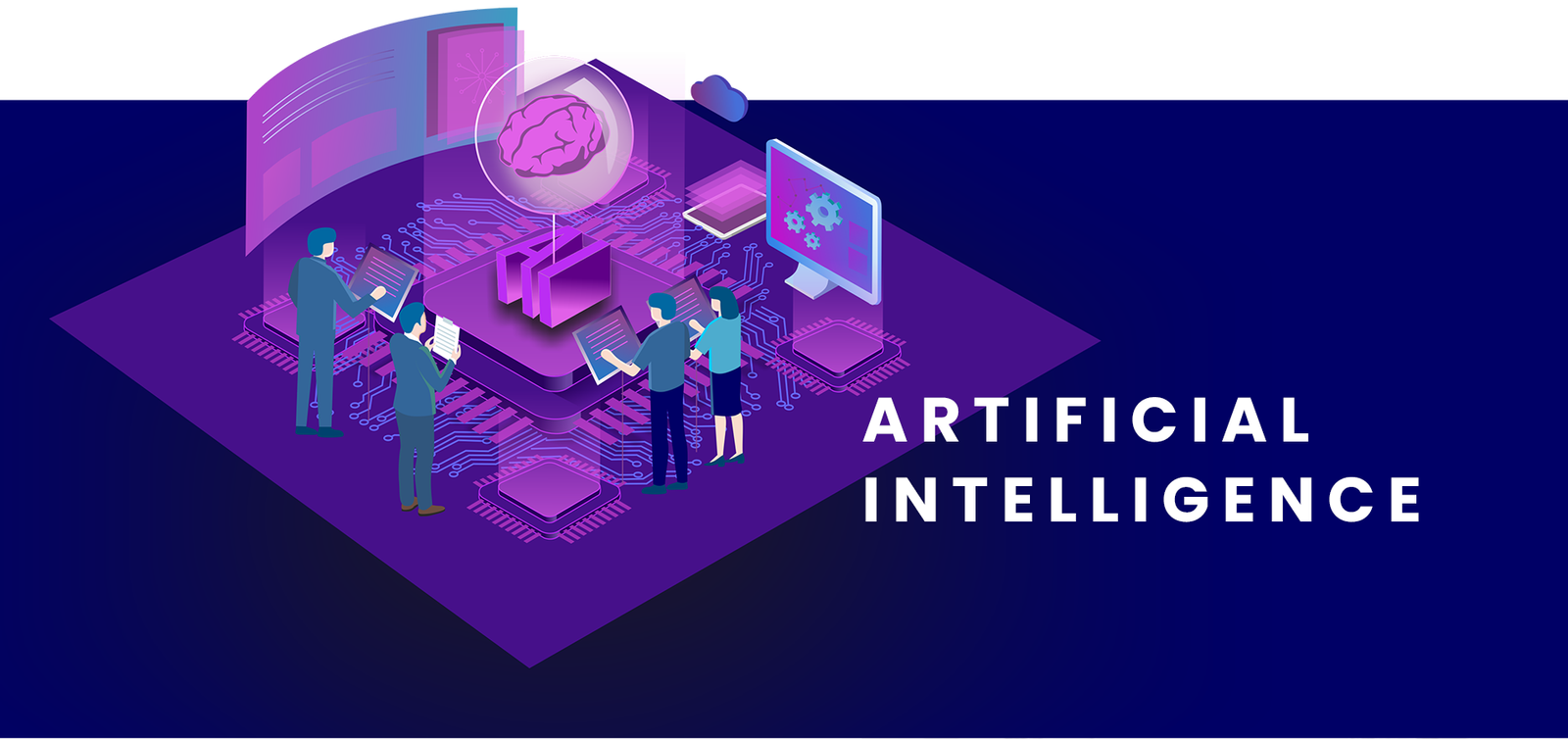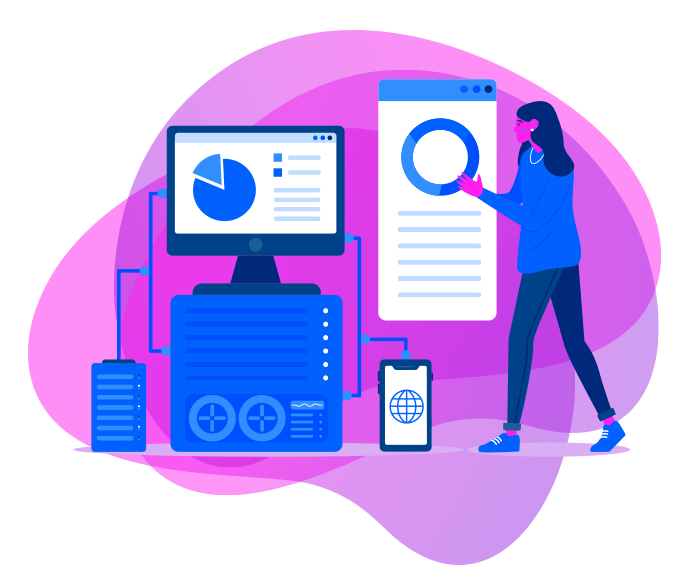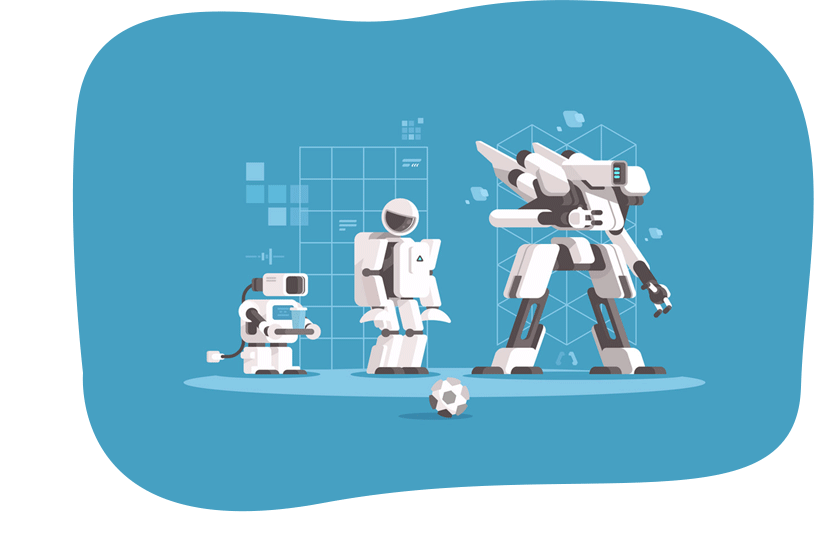- Why is Artificial Intelligence important for my business?
More and more companies are adopting advanced technology such as Artificial Intelligence (AI) into their business model. Similar to the websites and online spaces companies created in the late 1990s, this new tech is transforming from an innovation that can help a company get ahead to one that businesses must adopt just to stay competitive.
Depending on the specifics of your business, AI can often help to improve logistical efficiency and to automate processes that would otherwise normally require human attention. This can save your company both time and money, allow employees to focus on more important tasks and strategies, and give your business a way to know its customers in better and more insightful ways.
- How can Artificial Intelligence affect the growth of my business?
Because Artificial Intelligence (AI) improves over time, the benefits of adopting it will often last longer than those provided by a simple software or tech upgrade. Typically, when a business buys a new tool to use, it results in a one-time benefit, but purchasing a newer, better tool will, eventually and inevitably, be required when the previous one becomes obsolete. AIs have the advantage of iterative improvement, growing increasingly more capable at performing their assignments as they repeat them over and over.
Additionally, not only will AI help with the growth of your business, but it can also help you discover where it should be growing. Customer data often exists in incredibly large data sets, in volumes so large that no human being could ever parse it by hand. AI can systematically examine and analyze such data to give your business insight into your customers in ways previously thought impossible. That information can then inform you as to which customers to target with which services, and which areas of your business offer the greatest potential for growth and expansion.
- Is my business ready for Artificial Intelligence?
The simple answer to whether Artificial Intelligence (AI) could benefit your company is maybe. AI is usually not the only digital technology that a company will adopt when integrating advanced tech into its business model. AI is often applied through Big Data, Machine Learning, Cloud Computing, and the Internet of Things. Adopting AI is often part of an overall strategy of digital transformation, which involves transitioning a business to a new model that can more easily adapt and change as the pace of technology continues to accelerate.
Working with a technology consultant or a firm with experience in the field can help you determine whether AI is the right choice for your business and, if so, the most advantageous method for using it. If you are going to implement AI, you want to do so right. The way to achieve the best results is to partner with someone who thoroughly understands the technology and its application.
- When do I need Artificial Intelligence for my business?
You should probably incorporate Artificial Intelligence (AI) into your business very soon. More and more companies are adopting advanced digital technology to improve their bottom line and to manage the large amounts of data they collect through their websites, customer interactions, logistical information, and overall business processes. Rather than simply ignoring or deleting this information, companies are using AI to not only discover where the inefficiencies are within their business but also determine the best way of addressing those inefficiencies.
An important thing to understand is that the size of a business isn’t always the deciding factor for AI adoption, or even a major one. The value of Cloud Computing, for example, is that it allows a company that had previously been unable to afford a network infrastructure to now have access to advanced digital tech, along with servers and services around the globe.
- Is AI present or future?
Artificial Intelligence (AI) Is Not A Thing Of The Future; It Is Already Here
In fact, it’s already everywhere—when you use a smartphone, when you use an online chat window to speak with a customer service representative, when your car beeps at you because you are drifting out of your lane on the highway, when you make a vague request of Amazon’s Alexa and get the exact music you wanted in return. In all these cases, you are in some way interacting with automated AI processes.
AI is being integrated into our lives in ways large and small, perhaps most usefully to allow businesses to automate certain repetitive processes, create efficiencies, and reduce redundancies in areas we never before thought possible. Customers with questions are interacting with AI programs that determine what they actually need before they are connected with live customer service reps. Such streamlining reduces payroll costs and allows customer service issues to be resolved more quickly. Automated systems can predict a customer’s preferences, honing product recommendations for the individual. When applied effectively, AI can positively impact and enhance a busines at every level.
- What is Artificial Intelligence, and what are its advantages?
Artificial Intelligence, or AI, is the ability for computers to use algorithms (complex sets of instructions) and large datasets to perform specific tasks and, through many iterations, improve their ability to successfully perform those tasks over time. Machine Learning uses the data created by the AI’s processes to improve. In other words, AI can see its own results, learn from those results, and try to produce better results next time. And repeating a task a few million times allows the AI to get really good at it.
Distinguishing between Artificial General Intelligence (AGI) and Narrow Artificial Intelligence is important. AGI is the stuff of science fiction, with computers thinking like humans—it is often the bad guy in sci-fi movies. Narrow AI is the type being adopted by technology-savvy businesses.
The advantage AI offers is its ability to automate certain business processes and functions that are tedious and repetitive. This increases efficiency and frees up time for employees to handle more important assignments. For example, AIs can create and process invoices automatically, answer basic customer service questions, and make product recommendations.
- What is the importance of Artificial Intelligence (AI) in education?
Artificial Intelligence in education involves both risks and rewards. Because technology often advances more quickly than policy and regulation can keep up, the risk of unfair implementation arises, meaning that it can be incorporated without a focus on inclusion and equality. Additionally, the data fed to AIs is often personal data and must therefore be respected and protected from intrusions and other risks.
That said, AI can be an excellent tool for educators seeking the best methods for educational success. Regularly testing of students is increasingly the norm in many countries, and analyzing the information garnered from such tests can reveal the most effective ways to educate students and the areas students should focus more on in the future. The analysis can be part of an overall examination of educational patterns that AI can perform in a way that human beings simply cannot.

Artificial Intelligence (AI) is not a thing of the future; it is already here
In fact, it’s already everywhere—when you use a smartphone, when you use an online chat window to speak with a customer service representative, when your car beeps at you because you are drifting out of your lane on the highway, when you make a vague request of Amazon’s Alexa and get the exact music you wanted in return. In all these cases, you are in some way interacting with automated AI processes.
AI is being integrated into our lives in ways large and small, perhaps most usefully to allow businesses to automate certain repetitive processes, create efficiencies, and reduce redundancies in areas we never before thought possible. Customers with questions are interacting with AI programs that determine what they actually need before they are connected with live customer service reps. Such streamlining reduces payroll costs and allows customer service issues to be resolved more quickly. Automated systems can predict a customer’s preferences, honing product recommendations for the individual. When applied effectively, AI can positively impact and enhance a busines at every level.
With proper, responsible implementation of AI, an entire customer service department can be run through a database that is capable of answering thousands of questions simultaneously and then using the data gathered from its customer interactions to improve its performance, more accurately predict customer behavior, and make more appropriate product recommendations. A virtual assistant such as Amazon’s Alexa can not only learn about an individual user’s preferences but also collate the preferences of hundreds of thousands of users, linking that data with still other user preferences to reveal trends and patterns in the market.
AI can be an incredibly useful tool for business, but like any tool, it is value neutral. For it to help your business without causing problems down the road, it must be implemented ethically, intelligently, and with thorough oversight.

What AI is and What It is Not
To state the obvious, AI is not a miracle technology. The public perception of AI is, perhaps, a bit overblown. Although it is an undeniably powerful tool, it has limitations and can even have negative implications if not handled correctly. We have all experienced the downsides of AI. Sometimes an AI failure can be as minor as Alexa playing the wrong music or a customer service chatbot misunderstanding the problem you are seeking help with. Sometimes, the risks are much greater, such as when self-driving vehicles fail to adhere to the rules of the road.

So we must first be very clear about what AI is and what it can do for your company.
What often defines something as AI, as it is used in business, is “machine learning.” This is a subfield of AI that can automate processes to learn from itself and thereby improve its own efficiency. A traditional program or process, by contrast, may simply do what it is told to do (e.g., process payments, answer search queries), and if it has a flaw or inefficiency, it is stuck with it. It could repeat the same mistake or return the same misinterpretation over and over again.
AI, on the other hand, can take data, process that data as it has been instructed to do, study the subsequent outcomes, and then modify its treatment and application of the date to improve those outcomes. This might sound simple, but it is actually incredibly complicated. And despite being a process based on the idea of automation, it requires continuous human observation and oversight to work properly, along with mountains of data to input and study.
As a result, being cognizant of what AI is and isn’t capable of doing is important. As much as we may laud AI’s potential and power to address current and future problems, the fact is that the AI we are discussing here bears little resemblance to the antagonistic force it often portrays in science fiction. It is instead something much more mundane and everyday. Even the ominous warnings of such business leaders as Bill Gates and Elon Musk focus more on how automation could disrupt the human side of the global economy and lead to instability than on how it could destroy the world (though Stephen Hawking’s thoughts on AI may have been apocalyptic but it also gave him a voice to communicate.
But even without being an evil software monster taking over the globe, AI has inherent risks that could jeopardize your company if it is not incorporated and applied correctly. And to accomplish that, you need a reliable partner.
Risks and Rewards

Because most people automatically associate the words “artificial intelligence” with something scary or nefarious, one could assume that this negative impression is the fault of something AI did. But this is not the case. AI is created by people, and as such, it is vulnerable to the flaws and biases that people put into it, often without even realizing it. AI is only as capable as the humans who create it, program it, and see to its maintenance as it improves and develops over the long term.
This brings up important ethical issues that are worth addressing because they pose a risk for companies, in terms of both how their business is conducted and how the public perceives that business. For example, if a firm adopts AI and big data as a practice, and its products or operations continue to reflect the same systemic problems that many other businesses are having difficulty addressing, how much has the AI helped that firm? Certain processes, such as customer service, might be more efficient, but the business could have a PR nightmare on its hands when new challenges arise after AI solutions don’t solve the problems they are designed to address.
All these new tools—AI, machine learning, big data—are vulnerable to the same flaws and assumptions as traditional business practices when not properly incorporated or managed. When AI is implemented, gaps in knowledge and practice must be addressed, so that the company can avoid any negative public perception. For example, though AI can certainly improve the efficiency of businesses, it may cause, in collaboration with big data, violations of ethical principles on data privacy. The smartest businesses never lose their human touch, even when using the most advanced technologies. A tech partner in continuous contact with you and your company, who can address issues as you continue to integrate AI and big data into your business model, is the best asset you can have.
AI Is the Next Big Step, So Be Careful
AI is both a futuristic technology and, as can be seen in the number of tech companies and consultancies that offer its implementation, the next necessary step in maintaining a company’s competitiveness. The landscape is similar to that of twenty years ago, when the internet was first becoming widespread and just having a website put you ahead. Put simply, the current business atmosphere has created a certain amount of pressure to adopt AI before the “other guy” does—before it is too late. But, like creating your business’s first website, if you’re going to do it, you need to do it right.
AI involves an iterative process and technology. It is not simply a “one and done” event. In the healthcare industry, for example, AI can help hospitals and service providers quickly and efficiently determine which practices lead to improved patient outcomes and shorter hospital stays. A large part of how AI helps healthcare providers and patients is through the use of patient data and the constant study of and improvements in how data and technology can substantially improve how a business functions.

AI demands data, and many companies have loads of it ready to be used, derived from customers directly and from customer service interactions, but this also needs to be properly handled. Blue Ocean Global Technology partners with businesses to improve how AI and big data work over time, constantly improving, so that the value of AI to a company grows as new versions of the technology are implemented.
With every step forward in technology, newfound efficiencies lead to changes both within individual companies and within the overall economy. Many of these changes, such as technological advancements, are inevitable, but businesses have an ethical responsibility to address the fallout from such changes. Governments will often offer certain contingencies to workers left behind by economic revolutions, such as skills training or college classes. And individual business can reassign employees in redundant roles to new positions or train them to work with the team implementing new technologies.
We must recognize that technology is always moving forward and that simply ignoring how an industry is changing will not protect a business or its workers. Companies must remain competitive in the marketplace by adopting automation, while doing their best to protect their employees.
Services of the Future

Something to keep in mind when deciding how your business could benefit from this new technology is that AI is just a tool. Used correctly, it can be applied to a wide variety of business practices and problems. Working with the right consultant is important, so your business can quickly identify the areas where AI would provide the most benefit in the shortest amount of time.
Also important are the resources the client company brings to the table. Large amounts of customer data can be fed into AI and then data mined to uncover ways of improving customer profiles and predicting future habits and behaviors. For example, a company can apply natural language processing (NLP) to its database of customer service interactions, text conversations, and chat records to automate certain customer service functions. NLP can also help identify common customer complaints and issues, allowing them to be addressed more quickly and thereby improving customer retention and loyalty.
Feeding the history of your sales into an AI system can help you determine future product demand. Predictive analysis of your resources from inventory to HR can identify inefficiencies to address. Pattern recognition software can automate certain tasks, such as creating invoices. And more generally, machine learning allows you improve all these insights into your data over time, especially as the amount of data grows.
Because the power of AI and big data comes less from what these tools can do and instead from how they do it (that is, via automatic self-improvement), businesses should not consider AI the easy answer to every issue or problem. Despite AI’s vast potential, it cannot fix everything, and firms need to figure out exactly where AI and data offer the most promise. The key is partnering with the right tech consultant who can help you determine the best purpose and application for your needs.
How Far will AI Go?
Every major change in technology, including such advancements as robotics and the internet, has essentially been a single step up. A novel way of doing things is invented, companies adjust to the new environment, and business moves forward in a new way. Because the world of AI is progressing so quickly, expertise is absolutely necessary to keep a business on the right track. The body of regulation around AI and the exploitation of personal data is fraught and always changing. Violations of HIPAA requirements and general data protection regulations put companies at unnecessary risk. You need an AI consultant with expertise and transparency and who will maintain continuous contact, regularly updating you on how your resources are being used and how your business is protected.

For your business, AI can maintain a conversation with live customers long enough to determine what they need, especially if the AI has been supplied with plenty of data from your customer base. It can predict which customers are dissatisfied and react accordingly, or determine the most effective times to offer discounts. It can learn to identify hateful rhetoric and either mark it for removal or simply delete it immediately. More generally, AI linked with big data can identify patterns of risk and danger to your company, helping you avoid mistakes or traps that human employees are incapable of recognizing because they are hidden in the patterns of enormous amounts of data.
No Need to Go It Alone
Because AI, big data, and the associated technology are all incredibly specialized, attempting to adopt such tools from scratch, in-house, can be very expensive. In addition to the expense and hassle of hiring AI-knowledgeable employees and creating a competent team are the costs of acquiring the appropriate technological resources and the time needed for proper product development. Having an experienced partner who can work with you in depth is therefore of utmost importance. This expert can guide you through the process of discovering exactly where and how AI can help your business grow, become more efficient, increase profits, and prepare itself for the future.
It is important to remember that AI, again, is merely a tool. To quote Shakespeare, “There is nothing either good or bad, but thinking makes it so.” If your firm is going to integrate advanced technologies, big data, and AI into its processes, it needs to do so the right way. Blue Ocean Global Technology can help you and your business keep up with the competition while reducing risk, protecting your employees, and paving the way for a more successful future.
Artificial Intelligence can be Tricky
Talk to an expert today!




We Specialize in Artificial Intelligence.
Invest proactively into your company's transformation.
